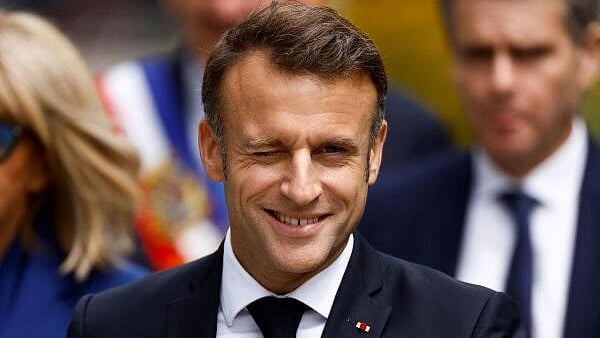
French President Emmanuel Macron.
Credit: Reuters Photo
By Lionel Laurent
French President Emmanuel Macron, the inveterate gambler, has won the right to keep playing.
Results for the final round of France’s snap parliamentary election suggest voters have delivered an emphatic “non” to Marine Le Pen’s far-right National Rally, but only a hesitant “maybe” to her rivals on the left and in the center.
The faintest contours of something approaching Keir Starmer’s path in the UK are visible as Macron prepares to rally Greens and Socialists to his cause, but it won’t be easy — and the broader risk is that fragmented politics in the euro area’s No. 2 economy is here to stay.
Just as the snap election itself felt worthy of a Netflix drama, the results look even more so. Macron might allow himself a trademark wink of self-satisfaction at seeing arch-nemesis Le Pen trail the pack with 143 seats.
A tactical alliance in the second round between Macron’s centrists and the left-wing Popular Front clearly worked to strengthen the so-called “republican front”, but Le Pen’s vague policies and her party’s inexperienced candidates also made it harder for her to win a bigger slice of the vote.
Higher up the leader board, things are much less clear. Macron’s centrist bloc is expected to come second, with 163 seats, also well short of the 289 needed for a majority.
While tactical voting limited the damage, he remains deeply unpopular — with even his own camp feeling betrayed — and has no more political capital left to ram through his reforms.
And yet he’s still managed to keep his bloc in the game as a potential coalition partner: After all, the winning left-wing bloc, whose program bears the obvious influence of firebrand Jean-Luc Melenchon, got 182 seats, short of a majority.
In other words, Macron has gone from king to kingmaker, and he’ll likely be looking to the left rather than the right for a first shot at a coalition. Financial markets, no doubt relieved that no party has the freedom to implement their most unrealistic and costly policies, may have to shift their thinking: What initially seemed to be a Giorgia Meloni scenario for the French far right could now be a Starmer scenario for the French far left.
Just as Labour became more electable after ejecting Jeremy Corbyn, the Popular Front’s path to power might involve breaking with Melenchon to build a more centrist coalition — combining Macron’s group with the Greens and Socialists could get quite close to 289 seats.
As center-left politician Raphael Glucksmann put it, there’s a parliamentary arc that can be built that’s neither Jupiter, nor Robespierre — neither Macron, nor Melenchon.
Several other center-left voices appeared to agree: Francois Hollande, whose return to parliament is an extraordinary comeback story for the former president, said Melenchon should “keep quiet” for the good of the Left.
This is all risky stuff. Even successfully emulating Starmerism won’t bring the kind of big majority his party currently enjoys. Whatever coalition ends up being cobbled together will take time and will be vulnerable to a level of political division that is virtually unprecedented in the Fifth Republic’s history.
At a time of spiraling deficits and a growth trajectory that’s below the euro area average, that will mean tough decisions – like tax increases – and little capacity to address deep-seated issues like productivity, innovation and demographic decline. Christopher Dembik, strategist at Pictet Asset Management Ltd., also expects any coalition to water down some of the impact of Macron’s reforms, from pensions to welfare benefits.
For now, there’s an audible sigh of relief that the European Union’s No. 2 economy has chosen to defer its right-wing populist “moment”.
But what comes next may prove rather fragile. With only three years to go before presidential elections, and Le Pen relishing the chance to keep attacking Macron from the opposition benches, France is far from back to normal.